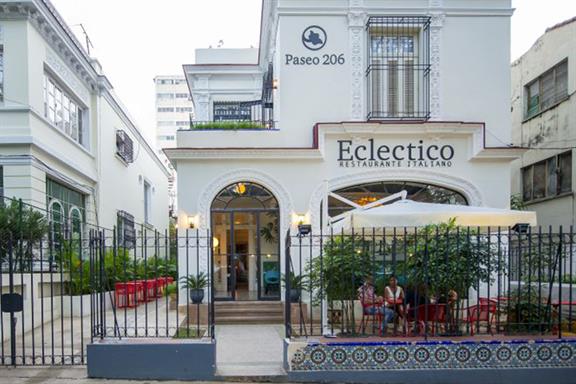
Taking the pulse of demand for Cuba travel
By Gay Nagle Myers / Travel Weekly
Over coffee one morning during my recent visit to Cuba, Andrea Gallima, co-owner of the Paseo 206 boutique hotel in the Vedado section of Havana, said that “Cuba is not a country to be seen. It’s a country to be experienced.”
He added that Americans seem confused about how to experience Cuba in light of the recent changes in travel regulations.
“The message about who can go and how is confusing, blurred and often misunderstood,” Gallima said. “I think some travelers from the U.S. believe they can no longer come here.”
The regulations put into effect in June by the Trump administration eliminated U.S. cruise-ship calls to Cuban ports and put an end to the People-to-People (P2P) subcategory of travel — which was most commonly used by Americans to visit Cuba — and they seemed to temporarily put the kibosh on travel to Cuba.
Has the dust settled yet? Are Americans still booking Cuba trips? How is travel to Cuba shaping up in the second half of 2019 and beyond?
For insights and answers, I spoke with several tour operators with programs to Cuba, including InsightCuba, Friendly Planet, Access Culinary Trips and Cuba Educational Travel (the tour company with which I traveled to Cuba last month, in partnership with the Center for Responsible Travel) to get their take on the situation.
Tom Popper, president of InsightCuba, summed it up this way: “There is confusion in the marketplace. However, there need not be, but it still is not easy to travel to Cuba as an individual, no matter how you look at it.”
To clarify, there are 12 existing categories under which Americans can visit Cuba, including humanitarian, family visits, academic, religious travel and professional meetings, but one, Support for the Cuban People (SCP) is the sole category that enables the average traveler to legally visit Cuba.
Travelers have two options. The simplest is to travel with a tour provider, which ensures that the trip adheres to the rules regarding accommodations, paperwork and activities.
The second option is independent travel, but planning such a trip with airfare, accommodations, paperwork and a full schedule of compliant activities gets tricky, according to Popper.
“Arranging activities in advance is time consuming, because communications with providers on the island is difficult and the guidelines are vague as to which activities are compliant with the current regulations,” he said.
“When it gets too confusing, travelers tend to shy away and go elsewhere.”
U.S. tour operators specializing in travel to Cuba remove the angst by customizing travel and activities for groups as small as two or three people. Collin Laverty, the president of Cuba Educational Travel, pointed out that group travel does not have to be in a motorcoach with 40 other people.
“There are still lots of ways to visit Cuba,” he said. “For example, we get calls from families saying they want to come for Christmas, so we put together a program for them that adheres to the SCP regulations for a full schedule of activities that directly support the Cuban people.
Peggy Goldman, president of Friendly Planet, agreed. “Nothing much has changed for Americans who want to see Cuba and experience the people, culture and all that the island has to offer,” she said.
“As long as Americans book their trips through a tour operator who has experience in legal travel, who has deep contacts on the island and can fill an itinerary with activities that fully comply with the [Office of Foreign Assets Control] rules, they have no worry at all as to whether or not they are complying with the law.”
Goldman said that Americans are continuing to visit Cuba, “although in fewer numbers.” She added, “I expect that the numbers will grow over time, as travelers learn the facts and regain confidence in the legality of the trips.”
Friendly Planet continues to get reservations every day for its three programs with set departure dates and is continuing to book small groups.
“We’ve reduced the size of groups to a maximum of 16, but we’re also getting bookings from families and small groups of friends who want to travel together on customized programs,” she said.
Access Culinary Trips, which is licensed to operate small-group culinary programs in Cuba under the SCP category, reported an increase in demand for its tours “despite the confusion following the June 4 announcement,” said CEO Tamar Lowell. “We continue to operate as planned.”
Culinary tours to Havana are planned in October and next March, in partnership with the Cuba Libre Restaurant & Rum Bar (which has locations in Philadelphia; Atlantic City, N.J.; Orlando; and Washington). In addition, the company has two to three departures per month on its signature Cuba tour and on its Havana weekend gateway program.
“Cuba is still one of our top three destinations, along with Italy and Vietnam,” Lowell said. “We’ve always met the criteria for the SCP category, so we didn’t have to make many changes when the newest restrictions were imposed in June.”
At InsightCuba, Popper said that his company had just completed a full review of its eight Cuba group programs before the June announcement.
“We retooled all tours, added some activities, took out some others. Every tour already was compliant with SCP regulations, so we did not have to tweak much,” he said.
He reported that bookings for his December trips are up, as are several programs slated for later on in 2020.
The music-themed tour in partnership with Putomayo World Travel, originally slated for next March, has been moved to November 2020.
Laverty said that although Cuba Educational Travel has a lot of business on the books for the end of the year and beyond, he estimated that revenues for the June 2019-to-June 2020 period will be down by 15% compared with the same period a year earlier, due to the policy changes.

